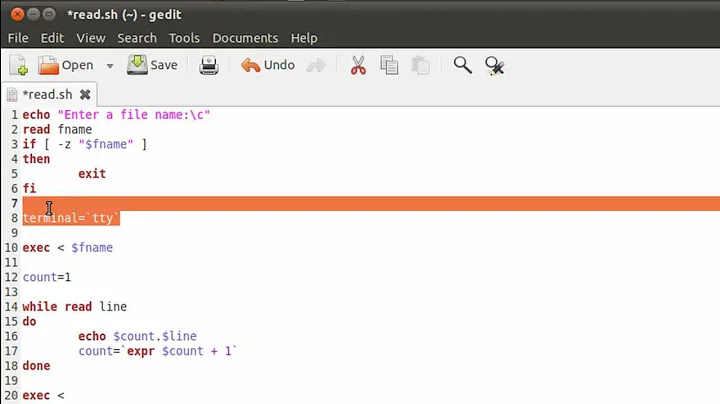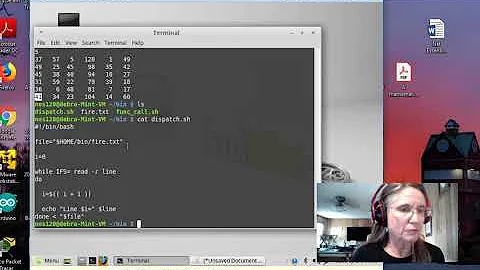Parsing a flat file using shell script
Solution 1
I'm not really sure if I get the point of your question.
At first: IFS is a variable, that contains a separator, like a tab, a space or something. By default it contains a space, tab and newline.
EDIT:
from a for-loop loop to a while-loop, suggested by terdon
while read line
do
echo $line|cut -d\: -f2
done < /path/to/file.csv
This generates this output:
blala
blala
***.***.**.**
You can do this with a while-loop as well, in personal I just like the for-loop here more.
What is the loop doing? At first, the loop reads the first line of the file.csv and saves it to the variable "line".
Inside the loop we echo the variable $line and cut it into peaces. We cut it with the delimiter (-d) ":", because in youre file.csv there is always a ":" between the identifier and the value. with the field-indicator (-f) we only want to show us the field 2 (-f2). The for-loop ends when the file.csv has no more lines.
For more informations see the man page of cut(1).
Solution 2
It may be tempting to use eval, but as passwords can contain arbirary chars (which could/would be executed as code, it makes it risky; bordering on a plain-and-simple: "Don't do it!".
This works - using arrays.
Contents of test file
User:blala
Pass:blala with spaces: and colons: and $PATH
IP:***.***.**.**
set -f # disable globbing
IFS=$'\n' # 'word' split only at newline char
value=($(sed 's/:/\n./' file)) # '.' to cater for empty value fields
echo user="${value[1]/./}"
echo pass="${value[3]/./}"
echo ip="${value[5]/./}"
Output:
user=blala
pass=blala with spaces: and colons: and $PATH
ip=***.***.**.**
Related videos on Youtube
user112534
Updated on September 18, 2022Comments
-
user112534 almost 2 years
I have a file like in following format
User:blala Pass:blala IP:***.***.**.**I tried with IFS but it is not working
input="/path/to/your/input/file.cvs" while IFS=',' read -r f1 f2 f3 f4 f5 f6 f7 do echo "$f1 $f2 $f3 $f4 $f5 $f6 $f7" done < "$input"I want to get User, Pass, IP values in my shell script .
Please help.
-
taliezin about 9 yearsDid you try anything?
-
taliezin about 9 yearsYou can edit your question with this info and what you are trying to achieve, so people can see what you have tried and will be able to help you.
-
 G-Man Says 'Reinstate Monica' about 9 yearsRather than just copying some other command that you saw somewhere, I suggest that you look at bash(1) and/or other bash (or Bourne shell) documentation (try searching this site), and see how
G-Man Says 'Reinstate Monica' about 9 yearsRather than just copying some other command that you saw somewhere, I suggest that you look at bash(1) and/or other bash (or Bourne shell) documentation (try searching this site), and see howIFS=is supposed to work. Hint:IFS=','is not a magic bullet that solves all problems.
-
-
Peter.O about 9 yearsBy default, $IFS contains a
spaceand ataband anewline -
 quenia about 9 yearstrue. I'll edit it!
quenia about 9 yearstrue. I'll edit it! -
Anthon about 9 yearsWelcome to U&L and thanks for your answer. Please (re-)read the help->tour especially the part about chit-chat. Greetings are inappropriate on this Q&A site and your name is already below the answer based on your profile
-
Peter.O about 9 years@StéphaneChazelas - I've added
set -f- thanks -
 terdon about 9 yearsYou may like
terdon about 9 yearsYou may likeforloops more, but I'm afraid they're very simply wrong here. Your answer will break if there is any whitespace on the line. There is basically never good reason to usefor i in $(cat file). You should always usewhile read i; do ... done < fileinstead. -
 quenia about 9 yearsI never really thought about the different behaviour of a
quenia about 9 yearsI never really thought about the different behaviour of aforand awhileloop. for this it works at least - I but your comment to my answer. -
Peter.O about 9 years@StéphaneChazelas - thanks again - fixed for empty 'value' fields.






